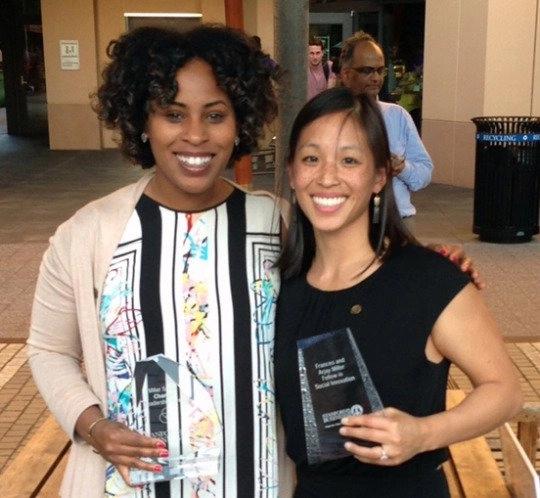MindRight Helps Youth Recover From Trauma Via SMS Mental Health Coaching

This is the third feature in our 2017 entrepreneur series, highlighting MindRight, which provides proactive SMS-based mental health coaching to inner-city youth.
In inner-city neighborhoods, one in four youth witnesses a murder before they turn seventeen. One third of those young people go on to experience post traumatic stress disorder as a result. If you haven’t grown up in an urban, low-income community, that statistic is hard to imagine. The long-term effects of this type of trauma are profound. High rates of exposure to violence in urban areas are exacerbated by the huge stigma around talking about your feelings or seeking mental health support in these communities.
For Ashley Edwards and Alina Lao, this issue hits close to home. Ashley’s parents grew up in inner-city areas of Philadelphia and New Jersey, and both of them witnessed a murder before they graduated high school. When Ashley graduated college and moved back to her father’s hometown to work in education, she was crestfallen. Nothing had changed. Students were routinely exposed to trauma and there was still no intervention. Exposure to murder, friends being killed, or enduring the agony of a parent’s incarceration were prevalent occurrences, yet students were still expected to come to school every day, complete their homework, perform well on tests, and move on in life as if nothing had happened. Ashley couldn’t help but wonder why no one was helping young adults cope with these tragedies, learn how to manage their emotional pain, and move forward in life.
Alina Lao also experienced the effects of unaddressed mental health issues growing up. Her mother suffered from severe depression, but her father blew these issues off simply as strange behavior. When Alina was 13, her mother finally sought out treatment after trying to take her own life. With no context or explanation as to what was going on, Alina was confused and scared. When her mom returned home, it was as if nothing ever happened, and Alina was still left in the dark. Later in life she went on to work as a mentor, tutor, and coach to young people. Through these connections with youth she saw the importance of acknowledging the feelings of young people.
When Alina and Ashley met at Stanford Business School, they realized technology could be the answer to providing better mental health support for inner-city youth. Direct, in-person counseling is next to impossible in these neighborhoods. There is only one guidance counselor for every 500 students and one school psychologist for every 2,000 students in an average urban high school. There is simply not enough support to go around. And young people in these communities are not comfortable discussing their feelings and mental health, which makes the barrier to entry even harder. But through their research, Alina and Ashley knew the key to getting through to students was meeting them where they already were—on their phones.

Together they launched MindRight, a proactive text messaging platform for youth experiencing trauma. MindRight works with volunteer coaches, who reach out to at-risk youth on both good days and bad. MindRight coaches go through a 15+ hour training program, developed internally by MindRight and its clinical advisors, before beginning to work with students one on one via text message. MindRight takes an evidence-based, personalized approach to psychoeducation, helping youth develop positive coping strategies so they can better manage life stress. Rather than waiting for students to reach out in times of crisis, MindRight is intentionally proactive. This structure enables mental health and mindfulness to become a part of each young person’s everyday routine. Coaches check in with youth daily, so they always have support through the highs and the lows of life.
Since launching their initial pilots in New Jersey and Washington D.C., MindRight has already seen their model work. Pre- and post-MindRight assessments, which are based on the EPOCH Measure of Adolescent Psychological Well-being, have shown that 100% of users who demonstrated high risk of trauma have improved their psychological wellness. Anecdotally, students express that MindRight is the only space they feel comfortable expressing what they’re truly thinking and feeling.
This school year, MindRight has lined up partnerships that will enable them to serve over 10 times as many students as they did in initial pilots last year. With students already loving the platform, saying it “could change a lot of lives” and “is like having a therapist at your fingertips,” we can’t wait to see how MindRight’s impact grows.
For more information, head to www.getmindright.org.